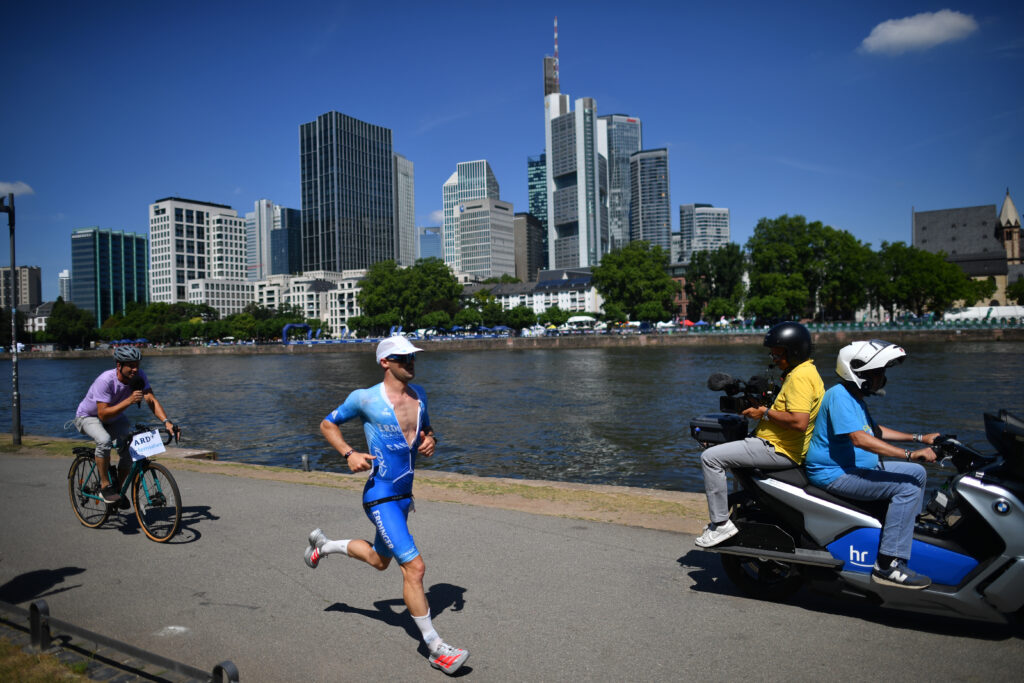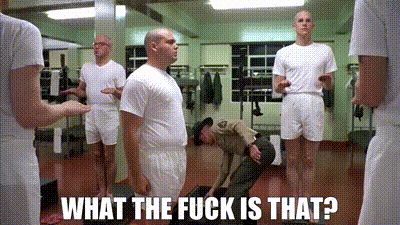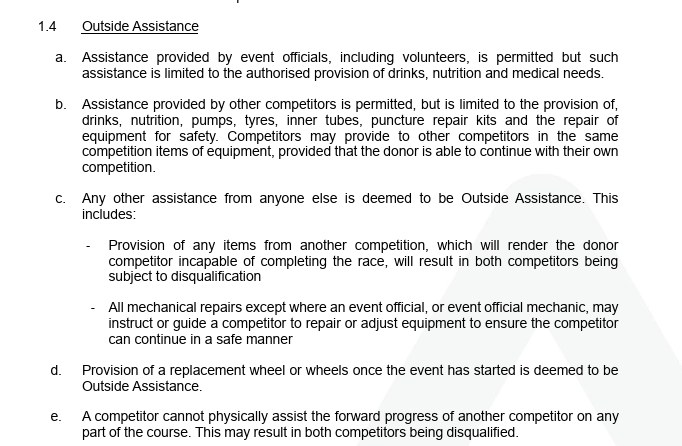Originally published at: Did Officials Go Overboard in Frankfurt? - Slowtwitch News

Whenever there’s a major sporting event, going hand-in-hand with it are complaints about officials. Whether we’re talking about appropriate time penalties or grid drops in Formula1, balls and strikes in baseball, whether something was a fumble or not, it gives fuel to the fire for passionate sports fans — and plenty of ammunition for sports punditry. Without officiating to complain about, sports can be a bit dull.
So, for fans of triathlon, we had plenty to dig our teeth into with this weekend’s IRONMAN Frankfurt race.
This was a race that had just about everything you could ask for, packed into a single eight hour sitting. There was arguably the deepest men’s pro field outside of an IRONMAN World Championship. You had a seemingly unfathomable winning time from Kristian Blummenfelt. The podium all went under 7:30. You had to finish in under 7:45 to even earn a paycheck! The performances were fantastic.
And, yes, we even had plenty of officiating drama, too. It’s all we could ever ask for in sports!
It is probably unsurprising that this race took place in Germany, as it was the German triathlon federation (DTU) that was the source of The Great Water Bottle and Storage Box Uprising of 2025. Germany, as it turns out, is the gift that keeps on giving when it comes to triathlon drama this year. And as we all know, there simply ain’t no drama quite like triathlon drama.
There were, by my count, three separate entirely questionable officiating decisions made during the course of the race. Each one of them would have been a mere footnote had they appeared at separate events, but having three, er, interesting choices at one event? That makes the officiating a story in its own right. Let’s look at each one of these calls.
Jonas Schomburg Forced Off the Bike
Of the three officiating calls made, I think this is the one that is the least questionable of the bunch.
Schomburg’s pedestaled bar set up came completely apart. He was left with a basebar and a massive stack of carbon where the aerobars were meant to connect to. Perhaps critically, though, that carbon was left open-ended. It’s the same basic safety issue that prevents someone from racing if they don’t have bar-end plugs put in: crash and you’re going to get impaled by that thing.
Could Schomburg have continued if, say, he had put a temporary plug and tape over the top end of it, as many of us have used a quarter and a roll of tape when a bar plug has magically disappeared? Perhaps. Regardless, this was absolutely the right call by the officials.
Aside: And we wonder why I’m pro rule making on aerobars. I mean, what did we expect to happen at some point with this kind of set-up?
As I said before when talking about Lucy Charles-Barclay’s bars, let me be clear: I’m not blaming the athlete for chasing gains that are clearly necessary to compete in the field. But that should be a clear indication that there need to be limits on how far you can go with pedestaling your bars.
Kristian Høgenhaug’s “Outside Assistance” Penalty
Onto the run course and Høgenhaug took an early lead. Not long after, he found himself with a one minute penalty for outside assistance. Here’s some of that sequence:
According to reports, Høgenhaug’s penalty was associated with coaching he received on the run course. Kasper Pedersen, the coach of Magnus Ditlev, provided encouragement to Høgenhaug, and was sternly warned. A minute later, Høgenhaug’s coach Torben Rokkedal Lausch ran alongside Høgenhaug for approximately 10 seconds. It’s after that sequence we get to the clip above.
Going to the IRONMAN rulebook, we find Rule 2.01(I), which states:
Friends, family members, coaches, or supporters of any type may NOT bike, drive, or run alongside athlete, may not pass food or other items to athlete and should be warned to stay completely clear of all athletes to avoid the disqualification of the athlete.
Having been to a bunch of IRONMAN events, if all officials were as strict as this one was, we would have thousands of disqualifications on our hands. From family members walking or running with athletes, to coaches providing time splits, to yours truly offering beer hand-ups at a race from time to time, this is stretching the limits of what outside assistance actually is and isn’t. Running alongside your athlete for 10 seconds isn’t assistance. Running with them for a minute probably is. Handing them food or water definitely is. Beer should be excepted because, well, triathlon should get a little more cyclocross in its life.
Høgenhaug would wind up finishing second, around 2.5 minutes behind Blummenfelt. Would this minute have put him closer to the win? Maybe. As it stood, it could have impacted the race, and that’s bad enough as it is. Marginal call at best.
Magnus Ditlev: Littering and…DQ?!?
A few kilometers away from Høgenhaug’s debacle, and we have a fantastic case of triathlon drama.
Let’s set the stage: the IRONMAN rulebook specifically defines littering penalties as, well, requiring a bit of purpose by the athlete.
Not dispose of trash or equipment on the course except at aid stations or other designated trash-disposal points. Intentional or careless littering will result in a time penalty or disqualification;
So if you accidentally litter, that’s decidedly not a penalty. But if you intentionally litter, or if you’re careless in how you drop something, that is a penalty.
Let’s roll the footage:
To describe it to you: Magnus Ditlev rolls through an aid station. It appears something drops behind him. An official immediately blows a whistle and calls him for littering. Magnus starts arguing with him. The official tells Magnus to pull over and serve the time penalty (run course time penalties are served at the spot of the foul). Magnus refuses. The official blows his whistle again, shows Magnus a red card, and informs him of the disqualification. At which point, Magnus utters the phrase we all were thinking of.
“Disqualification? What the f*** are you talking about?!?”
It’s perfect.
Magnus later follows up with “you can’t disqualify me,” before shaking his head and continuing to run. The disqualification would later be overturned, and he’d keep his eighth place finish on the day.
Let’s lead with the obvious: the littering penalty was a bad call. The action takes place at an aid station. It does not appear to be intentional nor careless. It looks like, well, how every pro triathlete in the last 20 years has rolled through an aid station. I completely understand Magnus’ incredulousness at the situation. The referee then further escalates the situation by immediately going to the red card, without giving it more time to explain the why he was doing something. That’s an opportunity for the referee to continue the explanation over a longer period before deciding to pull that card out.
Had the officials decided to dig in, they could have disqualified Magnus on a different basis: namely, the prohibition on unsportsmanlike conduct. Thankfully for those of us who swear like sailors, he was not penalized for a nearly perfect use of the most versatile word in the English language.
Photo: Alexander Koerner/Getty Images for IRONMAN

